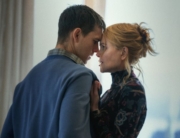There is an image in Teodora Ana Mihai’s sobering La Civil that captures the essence and oft-hopeless predicament of the film: two grasshoppers trapped in a tiny jar, moving in circles in the tight confines of the airless container until they are set free, only to be devoured by a lizard.
There’s an air of doom early on. In a dimly-lit house in Northern Mexico, teenager Laura (Denisse Azpilcueta) readies herself for a night out, while her mother, Cielo (a fantastic Arcelia Ramírez), folds laundry while a telenovela is on in the background. Cielo seems concerned, while her teenaged daughter comes across as flippant and carefree, applying lipstick and putting on a hot pink hoodie.
What quickly ensues is a gripping drama of Cielo’s agonizing search for Laura after she is taken by a cartel. As Cielo treads deeper into the labyrinth of this savage, underground world, it becomes an unpredictable story that, at times, almost feels like a war film: the sudden random blasts of gunfire, the piling of anonymous corpses in a morgue. A certain callousness also emerges within the fear-driven city. When Cielo goes to her ex-husband, Gustavo (Álvaro Guerrero), to plead for help to pay off their daughter’s kidnappers’ ransom, she is initially met with a subdued disbelief, aloofness. His much younger girlfriend shrugs the abduction off as commonplace. When Cielo turns to the police—the station full of photos of the missing—she is met with coldness, weariness.
Once Cielo becomes involved with the national police force, aiding Lieutenant Lamarque (Jorge A. Jiménez) in her knowledge of the area and its residents, as he in turn promises to help find Laura, the film and its themes deepen in complexity. As in the most intricate war movies, the violence is not cathartic nor exciting as one might expect. Meanwhile, everyone is caught in corruption and relentless traps.
The craftmanship in Mihai’s movie is unshowy and can’t be pinpointed neatly. It’s filmed with dark, yellowish undertones by cinematographer Marius Panduru that sometimes mimics the feel of a documentary. Combined with Alain Dessauvage’s tight but unflashy editing, the film stays close to Cielo’s point of view, her overriding sense of desperation, distrust, and fear. Unlike many thrillers, the film is devoid of a busy musical score. When music is heard, it can be a near-agonizing contrast to the grim life-or-death situations at hand, such as a jaunty track on Gustavo’s stereo that Cielo shuts off or the refrain of a Vikki Carr song Gustavo suddenly sings.
Ramírez’s performance captures her character’s determination, pain, and eventual transformation without resorting to gimmickry or the overwrought as Cielo changes over the course of the film: When Cielo impulsively chops off her hair, it’s as if forging a newfound identity within her dire circumstance. She is a sympathetic and steely protagonist of a revenge picture that dabbles in ambiguity more than thrills. Even as the movie finally reaches its conclusion, it literally asks two questions at once: Is there an end in sight, or is there no end in sight?

















Leave A Comment